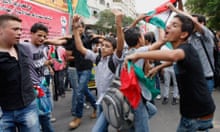Gilad Shalit, the Israeli soldier held captive in the Gaza Strip since 2006, could be returned to his family within days after the Israeli cabinet approved a deal to free more than 1,000 Palestinian prisoners in exchange for his release.
Cabinet ministers were in an emergency session until the early hours to vote on the proposal, which would lead to the release of 1,026 Palestinians held in Israeli jails, including militants involved in some of Israel's bloodiest terror attacks.
Twenty-six ministers voted in favour of the agreement, which was signed by Hamas and Israeli officials in a hotel room in Cairo on Tuesday; three, including the Israeli foreign minister, Avigdor Lieberman, voted against.
"If all goes as planned, Gilad will be back in Israel in the next few days with his family and his people," the Israeli prime minister, Binyamin Netanyahu, said.
A first wave of 450 Palestinian prisoners will be released before Shalit is freed. Among these are 280 who are serving life sentences. The remaining 577 will then follow.
Israel's Channel 2 reports that Shalit will be released across the border from Gaza into Egypt and then flown to Germany before returning to Israel.
The dramatic development is the result of a week of talks in Cairo between David Meidan, the Israeli official leading the Shalit negotiations, and representatives of Hamas's military wing. The negotiations, which Netanyahu said had been "long and exhausting", were mediated by officials from the Egyptian government and a German diplomat.
Under the terms finally agreed in the prisoner swap, 200 of the 1,026 Palestinians – including 15 high-security inmates - will be barred from returning to the West Bank and will sent to Turkey or Europe instead.
Among the prisoners who will be freed are 45 east Jerusalemites and five Arab Israelis, whose release Israeli negotiators have opposed in previous negotiations.
In Gaza city, news of the deal was met with spontaneous celebrations. The main Hamas leader, Khaled Mashal, claimed the exchange as a victory for Palestinians. "Our heroes in Israeli prisons in exchange for one fighter," he said – "One hundred kidnapped and arrested for no reason while fighting the occupation.
"I say this, to the Palestinians and freedom lovers in the world: we managed to destroy the shackles of the occupier."
In a televised addressed, Mashal said the negotiations had been "very, very difficult", and called the deal "a national accomplishment".
But he also issued a veiled threat to Israel, saying that a government that would release 1,000 prisoners would be prepared to release 8,000. And the Palestinians, he warned, would do whatever it took to make this happen.
Contradicting earlier reports from Palestinian officials, Israel has insisted that Marwan Barghouti, the head of Fatah's militant branch, who is serving five life sentences for planning and funding terrorist attacks, will not be among those freed.
High-profile militants rumoured to be due for release are Abdallah Barghouti, sentenced to 67 life sentences in 2004 for providing the explosives used in terror attacks in several Jerusalem cafes and the Hebrew University, and Abbas Sayed, imprisoned for his role in planning a double suicide bombing at the Park hotel in Netanya in 2002, in which 30 people were killed and 140 injured.
News of Shalit's release was met with emotional scenes in Jersualem, where the soldier's family have put a protest tent where they have campaigned for his release.
Shalit's parents, Noam and Aviva, were greeted with loud cheering as they visited the tent on Tuesday night.
"The joy is indescribable, but until [Gilad returns to us] we are restrained," said Aviva.
Shalit's return will undoubtedly boost Netanyahu's popularity at home, which suffered a blow during a summer of nationwide protests.
The prime minister told Israeli television he had invited Noam Shalit to his home, to break the news of his son's release, and had spoken to the soldier's grandfather, Tzvi, on the phone. Netanyahu said: "I told them that I am keeping my promise and I'm bringing their son and grandson home. I told them: 'I'm bringing your boy back.'"
The government's rightwing camp, a crucial pillar of political support to the prime minister, is likely to respond more critically to the release of highly skilled and influential Palestinian militants.
Rabbi Brigadier General Avichai Ronsky, a former leader of the Israeli Defence Forces, described the swap as "crazy".
"We know who the people being released are," he said. "They are artists at these kinds of things. A second after their release, they will be untraceable."
Netanyahu made reference to this conflict of interest in his statement. "I do not wish to hide the truth from you – it is a very difficult decision," he said.
"I feel for the families of victims of terror. I appreciate their suffering and distress. I am one of them. But leadership must be examined at moments such as this – being able to make difficult, but right, decisions."
For the past two and a half years, Hamas has denied the International Red Cross access to Shalit, who was captured when he was 19. The only contact with the solider during this time has consisted of three letters, an audiotape and a video, received in exchange for the release of 20 female Palestinian prisoners two years ago.


